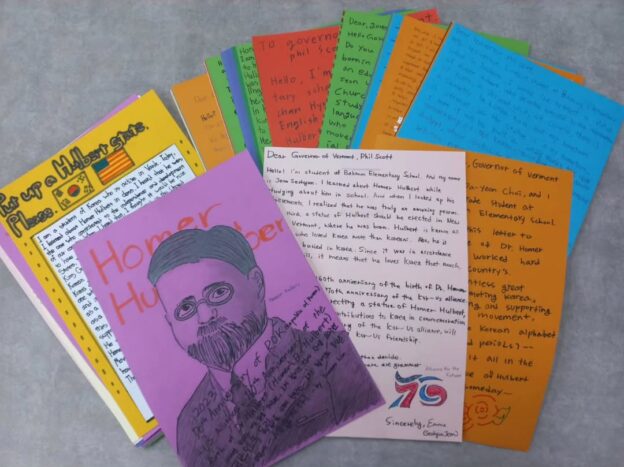
A group of young student diplomats from South Korea has sent letters to Vermont Governor Phil Scott, urging the establishment of a statue honoring Homer Hulbert, an American who dedicated himself to Korea’s independence over a century ago.
Since 2020, Incheon Bakmun Elementary School, founded in 1900, has partnered with the Voluntary Agency Network of Korea (VANK) to nurture young cyber diplomats. These students engage in various initiatives to promote Korea globally and contribute to positive change worldwide.
Through VANK’s activities in 2023, the students learned about the life and contributions of Homer Bezaleel Hulbert (1863–1949), an American who played a crucial role in Korea’s independence movement. Born in Vermont, Hulbert arrived in Korea in 1886 as a teacher at the country’s first modern public school, Yukyeong Gongwon. He developed a deep appreciation for Korean history and culture, publishing 23 books and 304 articles to introduce Korea to the global community.
Appointed as a special envoy by Emperor Gojong in 1906, Hulbert worked tirelessly to expose the injustice of the Eulsa Treaty to the international community. Even after returning to the United States, he continued to support Korea’s independence movement through lectures, interviews, and publications.
For 38 years, he fought for Korea’s sovereignty, writing in the New York Tribune about the excellence of the Korean language. He also authored Samin Pilji, Korea’s first Hangul textbook, and contributed to the founding of The Independent, Korea’s first privately-run newspaper.
In 1907, Hulbert attended the Hague Peace Conference alongside Lee Sang-seol, Lee Jun, and Lee Wi-jong to denounce Japan’s aggression toward Korea. He is also recognized as the first foreigner in Korean history to challenge international misrepresentations of Korea.
Notably, he criticized historian William Griffis for distorting Korea’s history in The Hermit Nation, pointing out that Griffis had never visited Korea and had relied solely on Japanese sources. He also challenged the title of Percival Lowell’s book, Chosun: The Land of the Morning Calm, arguing that Korea should be called The Land of the Radiant Morning to better reflect its true spirit.
In 1949, Hulbert was invited back to Korea by the government but passed away just a week after his arrival. His final wish was to be buried in Korea rather than Westminster Abbey, and he now rests in the Yanghwajin Foreign Missionary Cemetery in Seoul.
Moved by his deep love for Korea, 63 sixth-grade students from Incheon Bakmun Elementary School wrote letters in Korean and English to the governor of Vermont, advocating for the erection of a statue in Hulbert’s honor.
Student Sung Chae-hyun expressed, “I learned about Homer Hulbert in class today. He dedicated his life to Korea’s independence and progress. After hearing his story, I thought it would be wonderful to have a statue of him in the U.S.”
Choi Yun-seol added, “Hulbert helped shape the Republic of Korea as we know it today. Although he wasn’t Korean, he loved our country and devoted himself to it. That’s why I believe he deserves a statue in the U.S.”
Another student, Lim Yun-seo, wrote, “2023 marks the 70th anniversary of the Korea-U.S. alliance and the 160th anniversary of Hulbert’s birth,” and included a drawing of him in the letter.
Choi Da-yeon emphasized, “Building a statue in his honor would be a meaningful way to preserve his legacy and pass it down to future generations.”
VANK plans to send the students’ letters, along with an English-language video and promotional materials about Hulbert, to the United States via international mail.